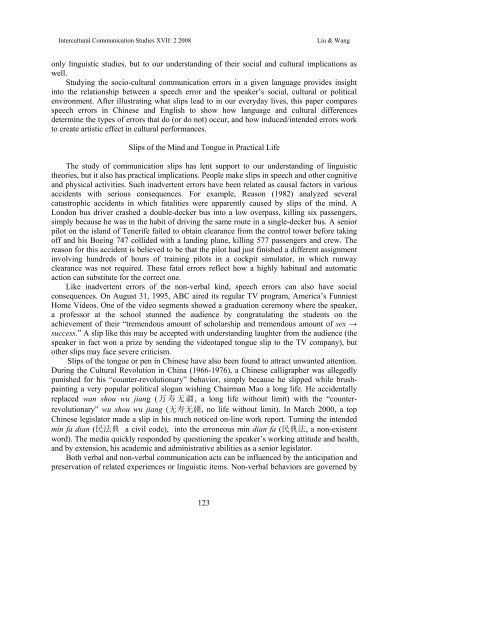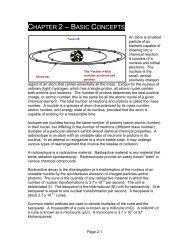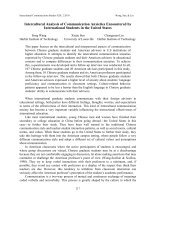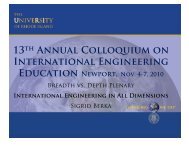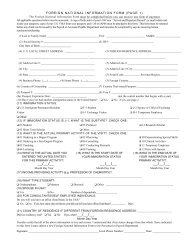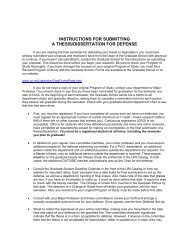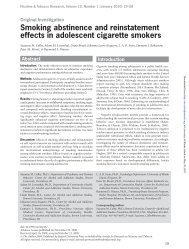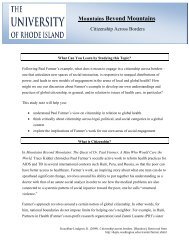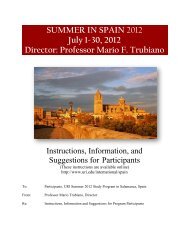Socio-cultural Impacts on Communication Slips
Socio-cultural Impacts on Communication Slips
Socio-cultural Impacts on Communication Slips
Create successful ePaper yourself
Turn your PDF publications into a flip-book with our unique Google optimized e-Paper software.
Inter<str<strong>on</strong>g>cultural</str<strong>on</strong>g> Communicati<strong>on</strong> Studies XVII: 2 2008 Liu & Wang<br />
<strong>on</strong>ly linguistic studies, but to our understanding of their social and <str<strong>on</strong>g>cultural</str<strong>on</strong>g> implicati<strong>on</strong>s as<br />
well.<br />
Studying the socio-<str<strong>on</strong>g>cultural</str<strong>on</strong>g> communicati<strong>on</strong> errors in a given language provides insight<br />
into the relati<strong>on</strong>ship between a speech error and the speaker’s social, <str<strong>on</strong>g>cultural</str<strong>on</strong>g> or political<br />
envir<strong>on</strong>ment. After illustrating what slips lead to in our everyday lives, this paper compares<br />
speech errors in Chinese and English to show how language and <str<strong>on</strong>g>cultural</str<strong>on</strong>g> differences<br />
determine the types of errors that do (or do not) occur, and how induced/intended errors work<br />
to create artistic effect in <str<strong>on</strong>g>cultural</str<strong>on</strong>g> performances.<br />
<strong>Slips</strong> of the Mind and T<strong>on</strong>gue in Practical Life<br />
The study of communicati<strong>on</strong> slips has lent support to our understanding of linguistic<br />
theories, but it also has practical implicati<strong>on</strong>s. People make slips in speech and other cognitive<br />
and physical activities. Such inadvertent errors have been related as causal factors in various<br />
accidents with serious c<strong>on</strong>sequences. For example, Reas<strong>on</strong> (1982) analyzed several<br />
catastrophic accidents in which fatalities were apparently caused by slips of the mind. A<br />
L<strong>on</strong>d<strong>on</strong> bus driver crashed a double-decker bus into a low overpass, killing six passengers,<br />
simply because he was in the habit of driving the same route in a single-decker bus. A senior<br />
pilot <strong>on</strong> the island of Tenerife failed to obtain clearance from the c<strong>on</strong>trol tower before taking<br />
off and his Boeing 747 collided with a landing plane, killing 577 passengers and crew. The<br />
reas<strong>on</strong> for this accident is believed to be that the pilot had just finished a different assignment<br />
involving hundreds of hours of training pilots in a cockpit simulator, in which runway<br />
clearance was not required. These fatal errors reflect how a highly habitual and automatic<br />
acti<strong>on</strong> can substitute for the correct <strong>on</strong>e.<br />
Like inadvertent errors of the n<strong>on</strong>-verbal kind, speech errors can also have social<br />
c<strong>on</strong>sequences. On August 31, 1995, ABC aired its regular TV program, America’s Funniest<br />
Home Videos. One of the video segments showed a graduati<strong>on</strong> cerem<strong>on</strong>y where the speaker,<br />
a professor at the school stunned the audience by c<strong>on</strong>gratulating the students <strong>on</strong> the<br />
achievement of their “tremendous amount of scholarship and tremendous amount of sex →<br />
success.” A slip like this may be accepted with understanding laughter from the audience (the<br />
speaker in fact w<strong>on</strong> a prize by sending the videotaped t<strong>on</strong>gue slip to the TV company), but<br />
other slips may face severe criticism.<br />
<strong>Slips</strong> of the t<strong>on</strong>gue or pen in Chinese have also been found to attract unwanted attenti<strong>on</strong>.<br />
During the Cultural Revoluti<strong>on</strong> in China (1966-1976), a Chinese calligrapher was allegedly<br />
punished for his “counter-revoluti<strong>on</strong>ary” behavior, simply because he slipped while brushpainting<br />
a very popular political slogan wishing Chairman Mao a l<strong>on</strong>g life. He accidentally<br />
replaced wan shou wu jiang (万寿无疆, a l<strong>on</strong>g life without limit) with the “counterrevoluti<strong>on</strong>ary”<br />
wu shou wu jiang (无寿无疆, no life without limit). In March 2000, a top<br />
Chinese legislator made a slip in his much noticed <strong>on</strong>-line work report. Turning the intended<br />
min fa dian (民法典 a civil code), into the err<strong>on</strong>eous min dian fa (民典法, a n<strong>on</strong>-existent<br />
word). The media quickly resp<strong>on</strong>ded by questi<strong>on</strong>ing the speaker’s working attitude and health,<br />
and by extensi<strong>on</strong>, his academic and administrative abilities as a senior legislator.<br />
Both verbal and n<strong>on</strong>-verbal communicati<strong>on</strong> acts can be influenced by the anticipati<strong>on</strong> and<br />
preservati<strong>on</strong> of related experiences or linguistic items. N<strong>on</strong>-verbal behaviors are governed by<br />
123


